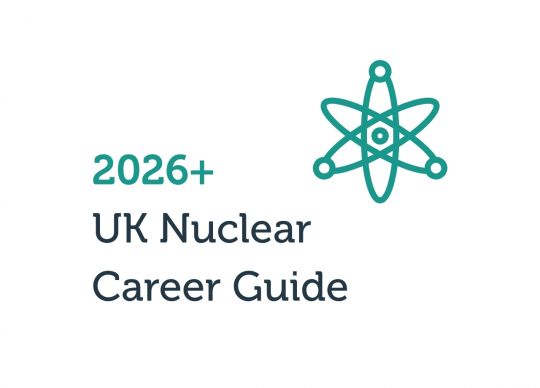
A 30-Year, State-Backed Opportunity
For decades, a career in the UK nuclear industry was mostly about managing the past. Today, it's all about building the future.
If you're a skilled engineer, project manager, or technical professional, your timing is perfect. After years of uncertainty, the UK government is now fully committed to nuclear power, seeing it as a vital part of the nation's future.
So, why the big shift? It comes down to two huge national priorities: hitting the legally binding Net Zero by 2050 target and securing our own energy independence. The government's position is now crystal clear: there is no credible way to hit these goals without nuclear power.
For any candidate, all this policy talk translates into one simple word: stability.
This isn't just about a single project. It's a 30-year programme. Here's the proof that this is the moment to plan your long-term career.
The Grand Strategy: 24GW by 2050
The foundation for your career is the government's Civil nuclear: roadmap to 2050. This document, published in early 2024, ends decades of stop-start planning. It sets a clear, ambitious national goal: to quadruple the UK's nuclear capacity to 24 Gigawatts (GW) by 2050.
That 24GW target isn't just a number. It's a plan to supply up to 25% of all UK electricity. It will provide the reliable, always-on power that complements other clean energy sources. This roadmap is the government's clear signal to the industry that the UK is committed for the long haul.
Proof 1: The Investment Cadence Ends "Boom and Bust"
The biggest problem with the UK's past strategy was its boom-and-bust cycle. A single, massive project would get approved, followed by a decade of uncertainty where skilled teams broke up and supply chains faded away.
The 2050 Roadmap fixes this. It introduces an investment cadence. This is a plan to greenlight 3-7 GW of new projects every five years between 2030 and 2044.
For you as a professional, this is the single most important commitment. It transforms the sector from a series of one-off projects into a continuous, rolling pipeline of work. It provides the certainty that allows specialist partners like Millbank to confidently map out long-term talent strategies, and for you to build a progressive, long-term career.
Proof 2: The Money is Committed
A strategy is only as strong as the budget behind it. The 2025 Spending Review gave real proof of this, allocating a headline £30 billion towards nuclear power.
And that isn't just a future promise. The 2025/26 budget immediately gave £5.4 billion to the Department for Energy Security and Net Zero (DESNZ) to get the programme moving. That money is being spent now to fund new projects, grow the supply chain, and rebuild the UK's fuel capabilities.
Proof 3: The Flagship Project is Greenlit
The final, concrete proof of this new era arrived on July 22, 2025.
On that date, the government and its partners secured the Final Investment Decision (or FID) for the £38 billion Sizewell C project. This is the formal go-ahead that means full construction can start.
Crucially, the government has taken a massive 44.9% stake in the project, making it the single largest shareholder. It's the first time the state has directly backed a new nuclear power station since 1988. This direct investment proves the UK's nuclear renaissance isn't just an ambition. It's an active, funded, national priority.
This entire strategy is being driven and coordinated by a dedicated new delivery body, Great British Energy – Nuclear, which is tasked with overseeing this multi-decade programme.
Your Future Workplace: The Four Pillars of the UK Nuclear Industry
The 24GW national programme isn't just one single thing. It's a diverse mix of projects, each with its own timeline, skill requirements, and career opportunities.
For a candidate, this diversity is a big advantage. It gives you different ways into the sector, whether your skills are in large-scale construction, high-tech manufacturing, R&D, or long-term project management.
The best way to understand the opportunities is to break the industry down into four main areas, all of which are active and hiring right now.
Pillar 1: The Giga-Projects (Hinkley Point C & Sizewell C)
These are the huge, reliable power sources for the UK's energy strategy. They are vast, multi-decade construction projects that will employ tens of thousands and provide stable, low-carbon power for at least 60 years.
- Hinkley Point C (HPC), Somerset: As the first new nuclear build in a generation, HPC is now at its peak construction. The huge civil engineering work (building the reactor domes and sea walls) is mostly complete. The project's focus for 2025-2026 is now shifting to the complex MEH fit-out. That stands for Mechanical, Electrical, and HVAC. It's the intricate job of installing millions of metres of pipes, cables, and control systems.
- Candidate Focus: The immediate demand at HPC is for skilled tradespeople (like welders, pipefitters, and electricians), commissioning engineers, and project managers who have experience with complex systems.
- Timeline: First electricity generation is targeted for between 2029 and 2031.
- Sizewell C (SZC), Suffolk: This is the project where the long-term vision really kicks off. Following its Final Investment Decision (FID) in July 2025, the £38 billion project is now ramping up for main construction.
- SZC is a copy of HPC. That's a smart strategy designed to make it around 20% cheaper by learning from its predecessor. It's financed by a new method called the Regulated Asset Base (RAB) model, which just means it's a very stable, secure, and low-risk project for investors.
- Candidate Focus: The skills needed at Sizewell C today are different from HPC. Demand is highest for civil engineers, groundworkers, heavy plant operators, and construction managers to build the site's foundations. The project is set to create 10,000 jobs at its peak.
Pillar 2: The SMR Revolution (The New Manufacturing Industry)
If the giga-projects are the present, Small Modular Reactors (SMRs) are the high-growth future. This part of the industry is about moving nuclear build from a construction site to a factory, creating a whole new high-tech manufacturing industry for the UK.
- The State-Backed Programme: On 10 June 2025, Rolls-Royce SMR was selected as the preferred partner to lead this. Their reactor design is 90% factory-built, with the modules simply assembled on-site.
- Candidate Focus: The jobs here aren't on a building site (yet). They are high-value roles in advanced manufacturing, systems engineering, and complex supply chain management. This will create a network of factories that will be a perfect fit for professionals from the automotive and aerospace industries. The goal is to have the first SMRs connected to the grid by the mid-2030s.
- The Emerging Private Market: Alongside the national programme, a new private SMR market is also popping up to power specific industrial needs. This includes projects from X-Energy & Centrica, Holtec Britain (targeting data centres), and Last Energy.
Pillar 3: The Legacy & Decommissioning Mission
This is the bedrock of the nuclear sector and offers incredible long-term stability. The Nuclear Decommissioning Authority (NDA) is the public body responsible for the 100+ year, multi-billion-pound mission of cleaning up the UK's first-generation nuclear sites.
- Candidate Focus: This is the ideal area for professionals who excel in long-term, complex project management. The work, especially at the huge Sellafield site in Cumbria, requires world-class expertise in project controls, waste management, robotics, and safety case development. These are stable, high-value careers that will last for generations.
Pillar 4: The Fusion Frontier (The R&D Edge)
This pillar is the cutting edge of science and the long-term future of energy. The UK is a world leader in fusion research, which is the attempt to replicate the process that powers the sun.
- Candidate Focus: The flagship project is STEP (Spherical Tokamak for Energy Production), a prototype fusion power plant set to be built in Nottinghamshire by 2040. This programme, run by the UK Atomic Energy Authority (UKAEA), is hiring for roles in physics, advanced materials science, robotics, and R&D programme management. This is the perfect entry point for candidates driven by science and innovation.
The Skills Transfer: Why Your Experience is in High Demand
The UK's 24GW nuclear ambition has created a massive skills challenge. The industry is facing a unique moment: a rapidly ageing workforce at the exact time of massive growth.
Recent assessments are clear. The sector needs to attract over 40,000 new skilled workers by 2030, and over 90% of nuclear employers are already struggling to recruit for critical roles.
This demand is so large that it simply cannot be met from within.
This has led to a smart, industry-wide strategy, often called nuclearisation. This is the process of actively recruiting experienced professionals from other high-standard industries and teaching them the specific nuclear context.
Employers have learned that while nuclear-specific details can be taught, the most valuable asset you have is your experience. It's your built-in understanding of what it means to work in a place where safety, quality, and regulations are paramount.
If you work in Civil Engineering, Construction, Oil & Gas, Automotive, or Aerospace, you already get it. You are not changing careers; you are re-applying your expertise to a new, long-term challenge. Here is how your skills translate.
From Civil Engineering & Construction: Building the Foundations
The new build programme, especially the ramp-up at Sizewell C, is one of the world's most complex construction projects. Your skills are fundamental to its success.
- Your Core Skills: You bring directly applicable expertise in structural analysis, site management, and planning the complex logistics of labour, materials, and heavy equipment.
- The Nuclear Bit: The main shift is cultural. It moves from balancing cost and schedule to a world where quality is the absolute, non-negotiable priority. In nuclear, getting it right first time is vital, as rework on safety-critical structures is often impossible. You'll adapt to a system where every single activity is meticulously planned, documented, and verified.
From Oil & Gas: A Shared Culture of Safety
The offshore Oil & Gas industry is, like nuclear, a high-hazard sector where the consequences of failure are severe. This has created a sophisticated safety culture that is a massive transferable asset.
- Your Core Skills: You bring a world-class understanding of Health, Safety, and Environmental (HSE) management. Your expertise in Process Safety Management (PSM) and hazard identification is a direct parallel to the principles of nuclear safety.
- The Nuclear Bit: The frameworks are highly compatible. The main shift is simply re-orienting your technical knowledge from chemical or explosion risks to radiological hazards. Both sectors share the core UK safety principle of reducing risks to a level that is As Low As Reasonably Practicable (ALARP).
From Automotive: Engineering for Reliability and Process
The modern automotive industry is a world leader in high-volume manufacturing that relies on relentless process control and quality. This discipline is exactly what the new SMR (Small Modular Reactor) manufacturing pillar needs.
- Your Core Skills: Your expertise is in rigorous quality management systems, like the IATF 16949 standard. You are an expert in defect prevention, reducing variation, and managing a complex supply chain.
- The Nuclear Bit: The shift is from a high-volume, cost-driven model to a low-volume, high-integrity one. In nuclear, a 60-year operational life and total safety are the main drivers, not unit cost. Your experience is the perfect foundation for the nuclear-specific quality standard, ISO 19443.
From Aerospace & Defence: The Closest Cultural DNA
Of all related sectors, aerospace shares the most cultural and procedural DNA with the nuclear industry. Both operate at the edge of technology, are governed by strict regulatory oversight, and have a safety-critical mission where failure is not an option.
- Your Core Skills: You are already used to meticulous planning, robust quality assurance (like the AS9100 standard), and an unwavering commitment to safety. Your expertise in systems engineering is directly transferable to designing and building a reactor.
- The Nuclear Bit: The cultural alignment here is exceptionally strong. The safety case in nuclear has a direct equivalent in the certification basis used in aerospace. The transition is less about learning a new way of working and more about applying your familiar, rigorous methods to a new technical field.
A Simple Guide to Security Clearance
Working in one of the UK's most secure industries means there is one practical step every professional needs to take: security vetting.
From the outside, this process can often seem confusing or even a little intimidating. The good news is, it's a straightforward system once you know the rules. This guide will walk you through exactly what to expect.
(All this information is based on the official public guidance from the UK government, which you can read in full here.)
For many new entrants, security clearance can seem like a chicken-and-egg problem: you can't get a cleared job without holding clearance, but you can't apply for clearance without having a sponsored job.
Here is the most important fact to remember: You cannot apply for security clearance yourself.
Clearance isn't a qualification you can earn. It's a risk assessment process that a client must sponsor you for. This is why you will see two types of job adverts:
- SC Cleared: The client needs a candidate who already holds active clearance.
- SC Eligible: The client is willing to sponsor the right candidate through the vetting process.
The Key Levels of Clearance
- BPSS (Baseline Personnel Security Standard): This is the foundation, not a formal clearance. It's a pre-employment check that verifies your identity, right to work in the UK, employment history (3-5 years), and any unspent criminal convictions.
- SC (Security Check): This is the most common level in the nuclear sector. It's required for roles that need long-term, frequent access to information classified as SECRET.
- DV (Developed Vetting): This is the highest and most detailed level. It's required for individuals who need frequent and uncontrolled access to TOP SECRET assets.
The SC Process & Key Rules
For most professionals, SC is the relevant standard. The process involves a few key stages:
- Honesty is Everything: You will complete a very detailed security questionnaire. The vetting process is all about assessing reliability. Any attempt to hide or falsify information is seen as proof of unreliability and is a primary reason for refusal.
- The Checks: The vetting body (UKSV) will run comprehensive background checks. This includes your criminal record, your financial history, and checks against Security Service (MI5) records.
- Residency: This is a key filter. To be eligible for SC clearance, you must normally have been a UK resident for at least the last 5 years. This rises to 10 years for DV.
The Reward: Career Pathways and Earning Potential
A career in the UK's nuclear programme isn't just stable, it's also highly compensated. The skills gap and massive new investment have placed a real premium on qualified professionals.
Here are the career paths and earning potential you can expect, based on the progressions we see in the market every day.
Path 1: The Nuclear Engineer
This is the technical heart of the industry. It’s a path with clear progression, where a Principal Engineer can earn, on average, over £70,000, and senior managers can earn significantly more.
- Graduate Engineer (0-2 years): Starting salaries for graduates typically fall in the £29,000 to £38,000 range.
- Engineer (2-5 years): With a few years of experience, you can expect to earn from £38,000 to £50,000+
- Senior Engineer (5-8+ years): As a senior, you are a key technical resource, with salaries ranging from £50,000 to £62,000+
- Principal Engineer (8-15+ years): At this level, you are a subject matter expert, leading major work packages, with salaries earning £62,000 to £80,000+
- Lead / Managing Engineer (10+ years): For those with line management or strategic discipline lead responsibilities, salaries typically range from £70,000 to £95,000+
How to Excel & Maximise Earnings: The best way to maximise your earnings is to get Chartered. Achieving Chartered Engineer (CEng) status through the Nuclear Institute (NI) is the key to unlocking senior and principal roles. Taking on management responsibility is also a clear route to promotion.
Path 2: The Nuclear Project Manager
This path is all about strategic delivery. Senior Project and Programme Managers frequently earn over £85,000 as they take on bigger and more complex programmes.
- Project Manager: Once managing your own projects, the average salary range is £50,000 to £65,000.
- Senior PM / Programme Manager: At this level, you are managing portfolios of projects or high-value flagship programmes, with salaries from £70,000 to £90,000+
- Director of Projects: Senior strategic leaders can expect to earn £90,000 - £140,000+.
How to Excel & Maximise Earnings: For this path, the key is becoming a Chartered Project Professional (ChPP) with the Association for Project Management (APM). This is the industry benchmark that validates your ability to deliver complex projects and unlocks the highest-level roles.
Path 3: The Specialist Contractor
This is the high-reward path for experienced professionals. Top-tier contractors can earn over £70 per hour for their specialist skills on urgent projects.
Indicative Hourly Rates: The rates below (based on 2025 data) show the premium paid for specialist skills.
- Senior Safety Case Engineer: £60.00 to £80.00 per hour.
- Senior Mechanical/EC&I Engineer: £50.00 to £65.00 per hour.
- Senior Project Manager: £60.00 to £85.00 per hour.
- Senior Construction Manager: £65.00 to £90.00 per hour.
Your Action Plan: How to Make the Move
You've seen the 30-year opportunity, the huge projects, and the clear rewards. The final step is to build a practical plan to make your move a success.
Here is your simple, 4-step checklist for entering the UK nuclear sector.
1. Invest in Credentials
Certifications are a bit like a common language in this sector. If you're a project professional, getting an APM Project Management Qualification (PMQ) or PRINCE2® Practitioner is highly valued. They aren't just a line on your CV; they show you already understand the structured, controlled way of working that's essential for these big projects.
2. Engage with the Industry
A great way to show you're serious about the sector is to join the Nuclear Institute (NI). It’s the main professional body for the industry and the best place for networking, learning, and understanding the culture. Being active with their resources or CPD framework clearly shows your commitment.
3. Actively Translate Your CV
Don't make a recruiter or hiring manager guess why you're a good fit. You need to translate your experience into the language of the nuclear industry.
- Re-frame your Oil & Gas terms: Don't just say Process Safety. Instead, write: Expertise in high-hazard process safety management (PSM), a principle directly parallel to nuclear safety.
- Translate your Automotive skills: Don't just list IATF 16949. Instead, build a bridge: Proven expertise in high-integrity quality systems (IATF 16949), with process control skills directly transferable to nuclear quality standards like ISO 19443.
- Integrate core nuclear language: Weave these key terms into your achievements (where relevant) to show you understand the culture: regulatory compliance, safety case, quality assurance, risk management, and safety culture.
4. Consider a Specialist Conversion Course
If you're looking for a deeper technical move or want to stand out for the most competitive roles, a postgraduate conversion course is a fantastic way to do it. Leading universities like the University of Manchester and the University of Birmingham offer specialised MSc programmes in nuclear science and technology.
Your Next Step with a Specialist Partner
The UK's nuclear renaissance is happening now. The demand for skilled professionals is critical and long-term.
The landscape is complex, but the opportunity for a stable, rewarding, and high-impact career has never been clearer.
Navigating this transition alone can be daunting. At Millbank, we're specialists. We speak the language of your industry and the nuclear sector. We aren't just a CV service; we are career partners, here to give you the transparent advice you need to succeed.
Ready to build your long-term career plan?



